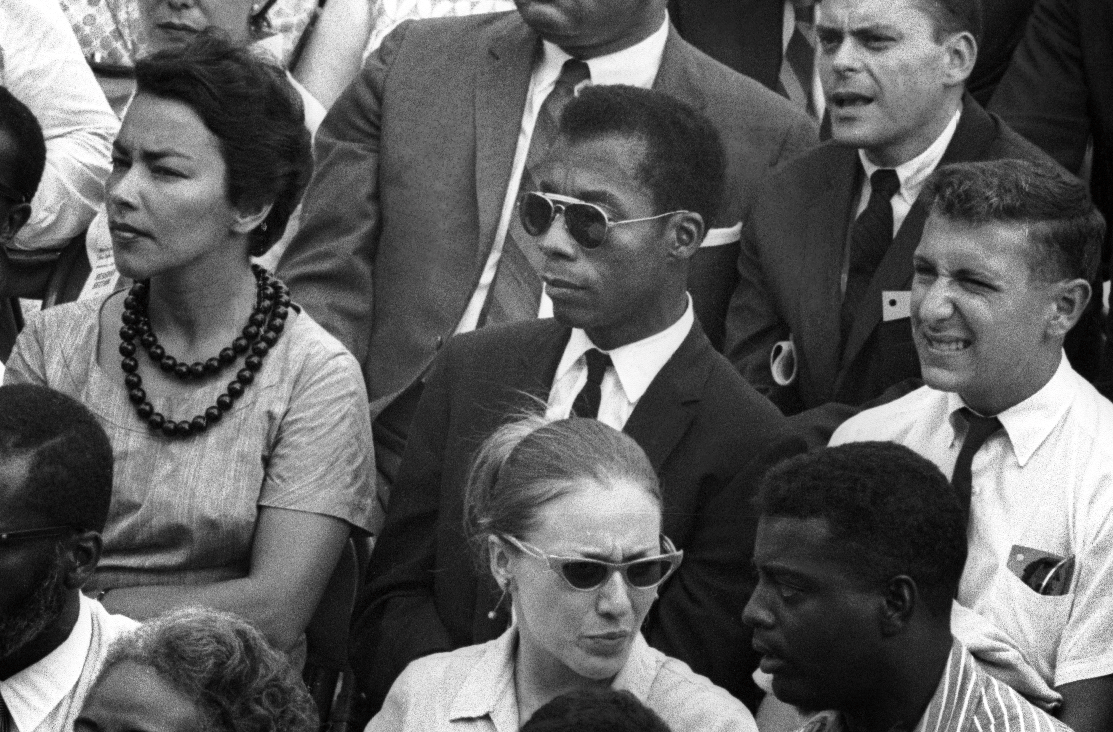MOVIE REVIEWS |
INTERVIEWS |
YOUTUBE |
NEWS
|
EDITORIALS | EVENTS |
AUDIO |
ESSAYS |
ARCHIVES |
CONTACT
|
PHOTOS |
COMING SOON|
EXAMINER.COM FILM ARTICLES
||HOME


Wednesday, March 15, 2017
MOVIE REVIEW/I
Am Not Your Negro
Baldwin's Fire This Time Letter To White America

A shot from Raoul Peck's documentary "I Am Not
Your Negro", directed by Raoul Peck.
Magnolia
by
Omar P.L. Moore/PopcornReel.com
 FOLLOW
FOLLOW
Wednesday,
March 15,
2017
First-class filmmaking in every respect, Raoul Peck’s searing documentary “I Am
Not Your Negro” is a brilliant autopsy of the white American social and cultural
condition and institutional white racism and brutality to Blacks via James
Baldwin’s 1979 notes entitled “Remember This House” (for what would be an
unfinished book.) Written as a chronicle of the assassinations of his friends
Malcolm X, Medgar Evers and Martin Luther King Jr, Mr. Baldwin’s notes are
palpable via Mr. Peck’s and Alexandra Strauss’s shrewd editing and the superb
archival research of Marie-Helene Barberis and Prudence Arndt.
Notable are fond remembrances of Lorraine Hansberry
and Malcolm X. Samuel L. Jackson's solemn and soothing,
soul-stirring narration has much to do with the depth of feeling in the writer's
tales. Mr. Jackson's work is the very best he's done on film. His
voice caresses Mr. Peck's fine film so movingly.
Mr. Peck lays out a roadmap: bucolic imagery, then inhumane or untenable
disruptions of nature and grotesque violations of humanity. Mr. Baldwin's
appearances are as a voice of warning, admonition and reason, a moderator and
indicter of white America's frenzy of violence against Black people.
Given today’s turbulent times in America and elsewhere, “I Am Not Your Negro”
couldn’t be more timely or necessary.
“Negro”, a mix of archival news footage, television clips (a priceless clip of
Mr. Baldwin on The Dick Cavett Show) and vintage American films examines the
effects of white cultural privilege and white supremacy on Blacks in America,
and more so on the white psyche. The film uses artists and activists to
bookmark chapters of America's evolution or devolution on race and racism.
At every turn, "Negro" is an appeal to conscience -to white conscience - and it
is always compelling viewing.
The documentary dissects white mythology like open-heart surgery and argues that
the culture upholding it is on life support - and at the expense of the millions
of Black people it has been propped up on the backs of.

James Baldwin (center) in a scene from Raoul Peck's
documentary "I Am Not Your Negro", directed by Raoul Peck.
Magnolia
Race, racism and the criminalization of Black people by white people, corporate
media and destructive American film imagery while simultaneously ignoring the
historic and continuing white violence against Blacks in America is often front
and center in Mr. Peck's enlightening documentary.
Just as interesting is the cultural analysis of how films like "Stagecoach" and
"The Defiant Ones" are viewed in Black and white communities. Images of
colorful, lively 1950s musicals like "The Pajama Game", when reframed in an
entirely different context, look monstrous, garish and ugly - excessive and so
sickening as to be disquieting and assaultive, even disgusting and downright
unsettling. The juxtapositions of white gaiety and Black pain are some of
the most jarring, outrageous and despicable moments of "I Am Not Your Negro",
aside from photos of lynchings.
The most arresting revelation of “I Am Not Your Negro” is Mr. Baldwin’s argument
that white behaviors toward Black people go beyond matters of race and deeper
instead to an individualized deficit of self-esteem and lack of soul further
induced by a bereft culture (aided by capitalism’s inherent flaws) that promotes
perfection, false gratification and an emptiness that yields devastating
returns.
The white imagination has offered devastation and deadly havoc so as to be
psychotic, Mr. Baldwin argues, and this irrational state of being has accounted
for the inability of many whites to live with themselves much less with Black
people. Hence segregation, which Mr. Baldwin alludes to as a severely
detrimental harm. The images of the two radically different pop cultural
worlds and ways of life in "Negro" are a segregation that proves unassailable.
Duality of beings are a theme throughout "Negro" and at its crux the film
reveals that two grandiose and murderous lies have been told about America:
white superiority and Black inferiority. After seeing "I Am Not Your
Negro" you are forced to rethink the safety of the white cultural and social
order as you have come to learn and know it.
Above all Mr. Peck’s terrific filmmaking delivers unblinking and unconquerable
truths via Mr. Baldwin. "Negro", which riveted and transfixed me to no
end, is a fascinating, inspirational document about white America’s
still-unexamined self-reflection and self-examination rather than an examination
of race. Mr. Peck's documentary also crucially amounts to a bible of the Black
experience in America. I was nodding almost all the way through, and I
spotted other viewers in the theatre doing the same.
Today, America’s divided house burns, blazing out of control. The flames
leap ever higher. Mr. Baldwin’s notes “Remember This House” are titled so for
this very reason - the House of America looks destined to crumble. ("No kingdom
can maintain itself by force alone," notes Mr. Baldwin.)
Cruelly, it is fitting that this Baldwin work - and by extension white America’s
- remains unfinished. So many hundreds of thousands, make that millions of
Black people - have died in the process of trying to make America more perfect
and in this new, deadly era of "greatness" the deaths (in Kansas, in Ferguson,
in Cleveland etc.) continue unabated. “I Am Not Your Negro” is fearless,
important viewing for everyone in America, from high-school age and above.
This marvelous documentary implicitly asks: how much will white society at large
permit or recognize the existence of Black people so as to allow the merest
penetration of (if not full participation with) the white consciousness?
Is the deliberate shunning and marginalizing of Black people by white society
that society's way of avoiding a look in the mirror at itself and its own
contradictions and failures in a world they constructed through violence against
those Blacks (and Native Americans)?
Mr. Baldwin argues that in addition to the horrors and holocaust of enslavement,
the Black person has been demonized as a boogeyman as projection and distraction
from the true monster lurking within the white community. This
demonization is utilized as power and leverage - and one of the surprising
things is that Mr. Baldwin speaks less of white supremacy than he does a
defective morality and brotherhood. There is much to unpack in an
economical 93 minutes, and Mr. Peck stays ever disciplined as the archival
footage speaks volumes.

Malcolm X, Martin Luther King Jr. and James Baldwin in
Raoul Peck's documentary "I Am Not Your Negro", directed by Raoul Peck.
Magnolia
The physical tension and violence permeating the American experience for Black
people is what Mr. Baldwin finds himself constantly grappling with as he asks
where he fits in this insane place, and if the white members of the human family
will acknowledge him and his people as its own family in the fragile glass house
called America. "There are days when you wonder what your role is in this
country and what your future is in it," Mr. Baldwin states as he speaks of a
"heartless, unthinking white majority". "Negro" is akin to a nomadic,
tenuous 500-year journey of a Black person trying to find their place in a
foreign land that is America, an epic journey littered with the dangers of
demonization, generations of sudden and persistent violence, and corpses.
Mr. Peck's film never lags or stiffens.
What Mr. Baldwin appeals most to during "I Am Not Your Negro" is humanism - that
the white population has violated its innate and fundamental principle:
humanism. Mr. Baldwin and Mr. Peck find texture in a cornocuppia of Black
faces, stories and realities, the latter man bolstering them with excellent
insertions of duelling cultural narrative touchstones, movies defining the Black
experience in America, and those defining what could be said to be an artificial
and fantastical white experience.
"I Am Not Your Negro" via Mr. Baldwin posits that the marginalization and
figmentation of Black people by white society is behavior having little to do
with whiteness and everything to do with guilt, fear, deep psychopathology and
paranoia. Glamourous lies are upheld while violent ugly truths are largely
suppressed. ("Violence is as American as cherry pie," Black Panther Party
member H. Rap Brown declares.) The U.S. national anthem, whose third verse
rejoices over the enslavement of Blacks and was written by Francis Scott Key
(who owned enslaved Black people), butresses Mr. Brown with its line, "the bombs
bursting in air...". (It is an anthem that, until later this year, San
Francisco 49ers NFL quarterback Colin Kaepernick refused to stand for.)
A true intellectual and visionary, Mr. Baldwin, who died in 1987 in France after
fleeing racism and homophobia in the U.S., always had his finger on the nervy,
raw pulse of race relations between Blacks and whites and of the instutitionally
racist white social order. The powerful microphone drops made throughout
Mr. Peck's documentary are exacting, potent and insightful. This resonant,
thought-provoking and altogether excellent documentary merits several viewings.
"I Am Not Your Negro" will blow your mind - in a good and critically necessary
way.
“I Am Not Your Negro” is rated PG-13 by the Motion Picture Association Of
America for disturbing violent images, thematic material, language and brief
nudity. Running time is one hour and 33 minutes.
COPYRIGHT 2017. POPCORNREEL.COM. ALL RIGHTS RESERVED.  FOLLOW
FOLLOW
MOVIE REVIEWS |
INTERVIEWS |
YOUTUBE |
NEWS
|
EDITORIALS | EVENTS |
AUDIO |
ESSAYS |
ARCHIVES |
CONTACT
| PHOTOS |
COMING SOON|
EXAMINER.COM FILM ARTICLES
||HOME


 FOLLOW
TWEET
FOLLOW
TWEET

 FOLLOW
FOLLOW